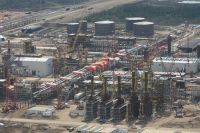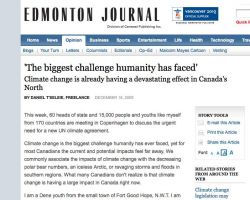Last week the Canada West Foundation (CWF) attacked Climate Leadership, Economic Prosperity, our economic analysis of government policies that would enable Canada to meet its national greenhouse gas emissions reduction target.
But instead of offering an engaging and thoughtful critique, their focus seemed to be on provoking dramatic headlines and fanning the flames of western regional politics.
I am an Albertan and I absolutely believe in our ability to be creative, entrepreneurial and part of a global solution to climate change. Our report showed how Alberta can do what Albertans want to do: take responsibility for our fair share of pollution, and build a strong and diverse economy of the future.
The CWF "report" is full of hyperbole, omissions and errors. We welcome critique of our work, but not fear mongering that appears designed to protect the status quo more than to solve the problem.

Climate Leadership, Economic Prosperity outlines a comprehensive package of climate policies that can begin to build the new Alberta of the future — not bring Alberta's economy "to its knees". CWF arrived at that false conclusion by cherry-picking data from the technical report; in fact, its entire analysis seems intent on justifying a future economy based on "business as usual." But global commitments to significantly reduce greenhouse emissions mean business as usual is no longer an option.
Market-based Solutions
Our analysis is very transparent and makes no attempt to hide the fact that compared to business as usual, there is a cost to those jurisdictions that have high pollution. Any market-based approach will put a price on pollution, so it is reasonable to expect that those who profit from polluting would be responsible for paying that price. When that principle is applied, the desire to minimize expense and maximize profits will drive the innovation required to reduce emissions. But the approach must be fair and that is why our proposed policies are applied economy-wide. This is a significant opportunity for Alberta to grow.
Alberta Can Do Its Fair Share
 Somehow, the CWF's critique neglected to include the fact that our economic analysis shows that over the next decade Alberta's economy would grow by 44% while doing its part to meet the federal government's current emission reduction target.
Somehow, the CWF's critique neglected to include the fact that our economic analysis shows that over the next decade Alberta's economy would grow by 44% while doing its part to meet the federal government's current emission reduction target.
Let's put this into perspective: it is twice the growth Ontario would experience, it is the same amount of growth Alberta experienced over the past 10 years, and it would allow Alberta to maintain by far the highest per capita GDP and the fastest growing economy in the country. Our analysis also shows that Alberta's oilsands production would double, and we would see growth in manufacturing in Alberta, in part because the money generated by putting a price on pollution would be used to reduce taxes.
So what is all the fuss? Alberta can significantly grow its economy and make a real contribution to reducing its emissions. Given that Alberta is responsible for 33% of Canada's current emissions, this seems fair.
As Roger Gibbons, President and CEO of the CWF, said on the CBC radio program As it Happens last week, Alberta can meet whatever target Copenhagen, Washington or Ottawa provides — but Alberta, along with the federal government, must step up and provide the policies that will enable us to meet that target while growing our economy. Our modelling shows it can be done.
 LISTEN IN: Roger Gibbons, President and CEO of Canada West Foundation, explains his analysis of Pembina's economic modelling report on CBC Radio's As It Happens (Dec. 10, 2009)
LISTEN IN: Roger Gibbons, President and CEO of Canada West Foundation, explains his analysis of Pembina's economic modelling report on CBC Radio's As It Happens (Dec. 10, 2009)
Marlo Raynolds, Executive Director of the Pembina Institute, responds to Canada West Foundation's criticism of Climate Leadership, Economic Prosperity (Dec. 10, 2009)
Polluters Should Pay
The CWF also said we need to make sure consumers pay for their pollution. This statement made me wonder if they had even read or understood our report given that our policy proposal puts a price on greenhouse gas emissions throughout the economy — including vehicle fuel consumption. In fact, our analysis clearly shows that personal and freight transportation will be paying more in carbon charges than the upstream oil and gas sector.
What is most surprising is that the CWF offers absolutely no solutions to these complex problems. It seems like they are simply calling for more talk and dialogue. There has already been nearly 20 years of discussion on this file in Canada. And despite big talk, both the federal Liberals and Conservatives have utterly failed over the past decade to implement any kind of comprehensive plan. By all means, let's keep talking about ways to improve our performance on these issues. But those discussions are no excuse not to act.
We will be reaching out to the CWF to clarify their misunderstandings of our analysis, and to move the debate to one based on facts as opposed to rhetoric. We will continue to put solutions on the table and we encourage everyone else interested in solving the global warming problem to do the same.
READ MORE: Economic modelling expert Mark Jaccard explains why "Canada desperately needs" to put a price on carbon emissions; Dene environmentalist Daniel T'Seleie describes how climate change is threatening indigenous cultures; the Canada West Foundation responds to criticism of its report.
Marlo Raynolds was the executive director of the Pembina Institute until January 2011.




